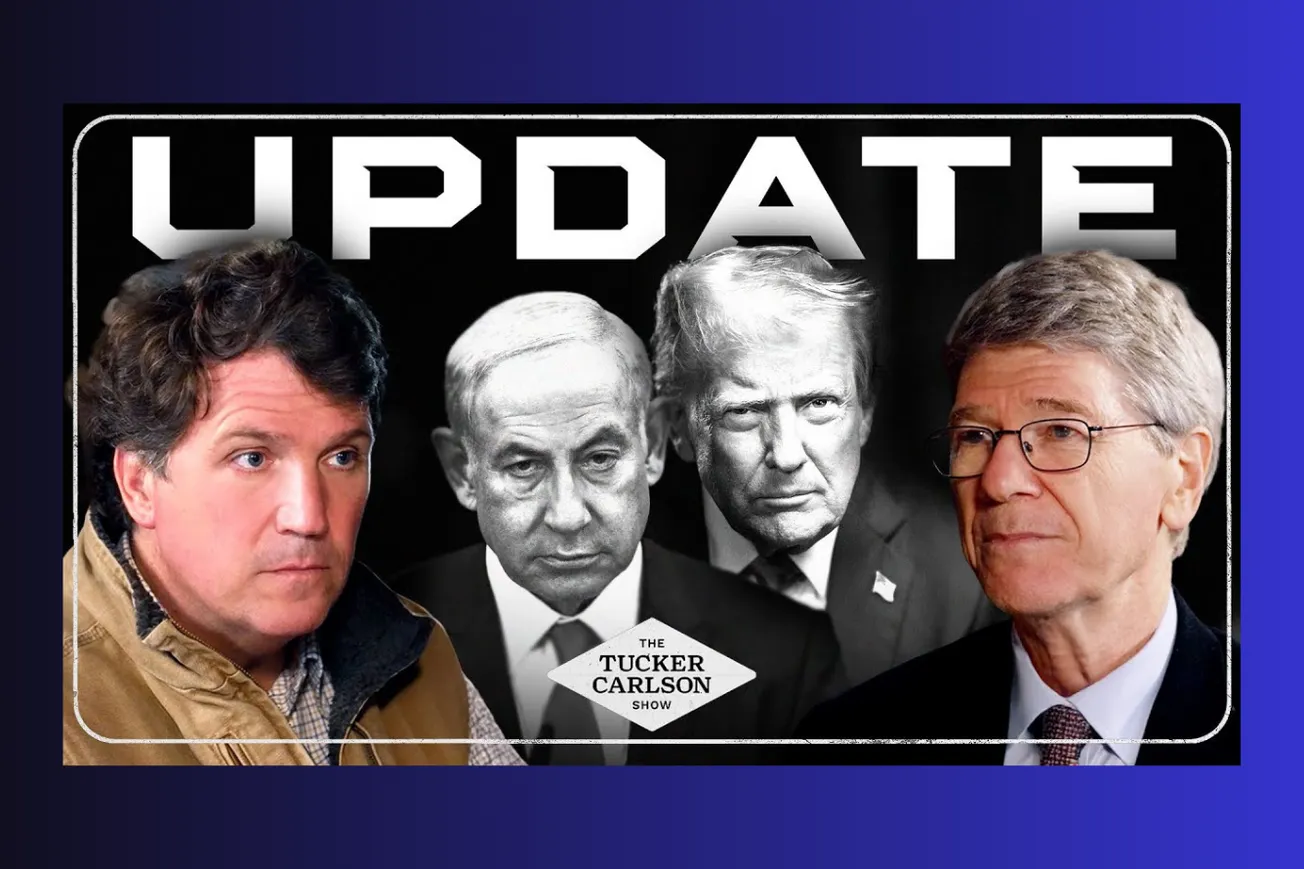Table of Contents
In a comprehensive analysis spanning decades of American interventions, Sachs traces how the CIA and military-industrial complex have consistently sabotaged peace efforts to maintain their vision of global dominance.
Key Takeaways
- Ukraine war could have ended in April 2022 with negotiated settlement, but U.S. deep state blocked peace to continue "weakening Russia"
- Intelligence agencies operate without meaningful civilian control, conducting operations that endanger global security without presidential knowledge
- Netanyahu's "Clean Break" strategy has driven America into thirty years of Middle East wars serving Israeli rather than American interests
- Iran repeatedly offers nuclear negotiations and peace agreements, but U.S. maintains conflict narrative to justify military confrontation
- CIA, MI6, and Ukrainian SBU recently attacked Russian strategic nuclear bomber fleet, risking nuclear escalation without White House approval
- Trump faces same deep state resistance that has thwarted every president since Kennedy's assassination in 1963
- Historical pattern shows American hostility toward Russia predates communism, dating back to British Empire's 19th-century "Great Game"
- Current conflicts represent continuation of 30-year project for unchallenged American global hegemony, not genuine security threats
The Ukraine Deception: How Peace Was Sabotaged
Jeffrey Sachs provides devastating testimony about how close Ukraine came to ending its war in spring 2022. On April 15, 2022, a draft peace agreement existed between Ukraine and Russia that would have immediately stopped the killing. The United States government intervened directly, telling Ukraine to reject the deal and continue fighting.
Three years later, Ukraine has suffered over one million casualties, lost significant territory, and seen its economy destroyed. "Nothing of the last 3 years has been any help whatsoever to Ukraine," Sachs states bluntly. The so-called "friends of Ukraine" have systematically destroyed the country by encouraging endless war rather than accepting achievable peace.
The pattern mirrors a boxing coach telling his bloodied, losing fighter to keep getting pummeled rather than accept a draw. This reflects the deeper reality that Ukraine's suffering serves American strategic goals of "weakening Russia" rather than Ukrainian national interests.
Sachs details how Ukrainian President Zelensky initially agreed to neutrality within days of Russia's invasion. Turkish mediators facilitated rapid progress toward a framework agreement by late March 2022. The fundamental terms were clear: Ukrainian neutrality in exchange for Russian withdrawal and security guarantees.
Deep State Architecture: The Unaccountable War Machine
The conversation reveals how intelligence agencies operate as a shadow government with minimal oversight. Sachs describes the CIA as having functioned without meaningful accountability for fifty years, conducting dangerous operations while maintaining "plausible deniability" for elected officials.
Recent Ukrainian attacks on Russian strategic bomber bases—carrying nuclear weapons—exemplify this recklessness. These operations, proudly named "Operation Spiderweb" by Zelensky, required Western intelligence support to execute attacks hundreds of kilometers inside Russian territory. Yet the White House claims ignorance of the mission.
"Either they're lying or they're telling the truth. If they're lying, that's one thing. If they're telling the truth, it's also horrifying," Sachs observes. Intelligence agencies either conducted unauthorized operations risking nuclear war, or the president approved attacks on Russia's nuclear infrastructure—both scenarios represent catastrophic governance failures.
The CIA's institutional culture prioritizes operational continuity over democratic control. Sachs notes that no U.S. president has ever achieved meaningful control over the agency, with the notable exception of John F. Kennedy, who famously wanted to "tear it into a thousand pieces"—and paid the ultimate price for that ambition.
Historical Patterns: The Great Game Continues
Sachs provides crucial historical context showing that American hostility toward Russia predates any ideological justification. He traces current conflicts to a 180-year pattern of great power competition, referencing historian Gleason's research on British-Russian rivalry in the 1840s.
Britain came to hate Russia by 1840 despite being allies against Napoleon in 1815. Extensive archival research revealed no substantive reason for this hostility—Russia simply represented a competing great power. The British elite concocted the "Great Game" narrative, claiming Russia threatened British India through Afghanistan, despite zero evidence of Russian intentions to invade the subcontinent.
This culminated in the Crimean War of 1853, where Britain and France attacked Russia to eliminate its Black Sea naval presence. Lord Palmerston's strategy sought to "render Russia a third-rate power" by removing access to warm-water ports—precisely the same objective driving current NATO expansion.
The pattern reveals how great powers manufacture conflicts with competitors regardless of specific grievances. When the Soviet Union ended in 1991, Sachs witnessed Boris Yeltsin personally declare Russia's desire for friendship and normal relations with America. Instead of embracing this historic opportunity, U.S. strategists immediately began planning Russia's further dismemberment.
Netanyahu's Clean Break: Thirty Years of American Blood for Israeli Expansion
Sachs exposes how Benjamin Netanyahu's 1996 "Clean Break" strategy has driven American foreign policy for three decades. This plan explicitly rejected the two-state solution, advocating instead for Israeli control over all Palestinian territories plus expansion into Lebanon and Syria.
The strategy recognizes that such expansion would face resistance, requiring destruction of regional governments supporting Palestinian rights. Rather than negotiate with militant groups directly, Clean Break advocates destroying the state sponsors—Iran, Syria, Iraq—through American military power.
General Wesley Clark and Air Force Commander Dennis Fritz have documented how the Pentagon received lists of countries to attack following this Israeli agenda. The targets included Iraq, Syria, Libya, Somalia, Sudan, and ultimately Iran—precisely the wars America has fought since 2003.
Fritz discovered during his Pentagon service that the Iraq War was explicitly designed to serve Israeli interests rather than American security. As a classified document reviewer, he realized "this is BB's war. We're going to war because Israel said so." The human cost—thousands of American military deaths and hundreds of thousands of Iraqi casualties—served Netanyahu's regional ambitions.
The Syria operation exemplifies this pattern. When Obama declared "Assad must go" in 2011, he authorized CIA Operation Timber Sycamore to overthrow the Syrian government. Thirteen years of warfare killed hundreds of thousands, destroyed ancient cultural sites, and flooded Europe with refugees—all to remove an Iranian ally from power.
Iran's Peace Offers: Rejecting Diplomacy for War
Perhaps most shocking is Sachs's revelation about Iran's consistent peace overtures. For over a decade, Iran has explicitly stated its willingness to forgo nuclear weapons in exchange for sanctions relief and normal relations. International Atomic Energy Agency monitoring would verify compliance, with neighboring Arab states supporting such arrangements.
The 2002 Arab Peace Initiative demonstrates regional consensus for normalizing relations with Israel contingent on Palestinian statehood. Saudi Arabia, Jordan, Egypt, and other Arab nations have repeatedly confirmed their readiness for full diplomatic and economic relations with Israel under these terms.
Iran fits this pattern, seeking regional stability and economic development rather than nuclear confrontation. "Iran does not want a nuclear weapon," Sachs states definitively. "Iran's neighbors do not want Iran to have a nuclear weapon. Iran's major ally, Russia, does not want Iran to have a nuclear weapon."
The obstacle is not Iranian aggression but American and Israeli refusal to accept negotiated settlements. The narrative of imminent Iranian nuclear capability has persisted for over two decades without materialization, serving as pretext for maintaining conflict rather than genuine security assessment.
Trump's Dilemma: Constitutional Authority Versus Deep State Power
The conversation illuminates Trump's predicament in confronting entrenched institutional resistance. While possessing constitutional authority to end these conflicts, Trump faces what Sachs describes as a "wall of deep state opposition" that has thwarted presidential intentions for decades.
Recent Ukrainian attacks on Russian bombers demonstrate how intelligence agencies can escalate conflicts while maintaining plausible deniability. Trump cannot negotiate peace while CIA operations actively provoke adversaries, creating facts on the ground that constrain diplomatic options.
Sachs advocates for direct U.S.-Russia negotiations to establish clear parameters preventing further escalation. Such discussions would necessarily exclude NATO allies and Ukrainian officials whose interests diverge from American security. The current approach of seeking Ukrainian consent for peace agreements empowers Zelensky's regime to perpetuate conflicts indefinitely.
The fundamental issue is not diplomatic complexity but institutional capture. Congress members like Lindsey Graham and Richard Blumenthal have built careers promoting endless wars despite consistent failures. Their continued influence reflects how the military-industrial complex captures both parties through campaign contributions and lobbying.
The Nuclear Precipice: Risking Civilization for Hegemony
Sachs emphasizes the existential stakes of current policies. The Bulletin of Atomic Scientists' Doomsday Clock shows humanity closer to nuclear war than ever before—90 seconds to midnight compared to 17 minutes in 1991 when the Cold War ended.
This deterioration directly results from American refusal to accept multipolarity. Rather than celebrating the Soviet Union's peaceful dissolution and building cooperative relationships with former adversaries, U.S. strategists immediately began planning for permanent global dominance.
The 1992 "Wolfowitz Doctrine" explicitly stated that American strategy must prevent any rival from achieving regional hegemony. This zero-sum thinking transforms every successful nation into a potential threat requiring confrontation. China's economic development, Russia's energy resources, and Iran's regional influence all become challenges to American supremacy rather than opportunities for cooperation.
Such thinking guarantees eventual conflict regardless of other nations' intentions. When great powers refuse to accommodate rising competitors, they create the very security dilemmas they claim to prevent. Military buildups intended for deterrence appear threatening to neighbors, generating arms races and alliance formations that increase rather than decrease war risks.
The Path Forward: American Interests Versus Imperial Ambitions
Sachs concludes by clarifying genuine American interests versus imperial overstretch. Real security requires avoiding nuclear war, maintaining economic prosperity, and preventing terrorist attacks on American soil. None of these goals require global military dominance or regime change operations.
Ukrainian neutrality serves American interests by preventing great power conflict in Europe. Iranian normalization eliminates Middle East nuclear risks while enabling regional economic development. Israeli-Palestinian peace removes primary grievances that motivate anti-American terrorism while allowing both peoples to prosper.
The alternative—continued confrontation with Russia, China, and Iran simultaneously—risks not just military defeat but nuclear annihilation. America's conventional military has not won a decisive victory since World War II, yet political leaders continue believing force can solve complex geopolitical problems.
"Our only risk is a nuclear war," Sachs warns. "Stay clear of a nuclear war. Please stay clear of these ultimate confrontations. Don't fight Russia to the end. It's a great power. You can live side by side with it. Same with China."
The choice facing America is fundamental: accept a multipolar world where great powers coexist peacefully, or risk civilization itself in pursuit of impossible hegemony. Trump's success in ending these conflicts will determine not just his political legacy but humanity's survival in the nuclear age.
Common Questions
Q: Could the Ukraine war really have ended in April 2022?
A: Yes, draft agreements existed with Ukraine accepting neutrality in exchange for Russian withdrawal and security guarantees, but U.S. intervention blocked implementation.
Q: Does Iran actually want nuclear weapons?
A: No, Iran has consistently offered to forgo nuclear weapons in exchange for sanctions relief and normal relations, with international monitoring verification.
Q: Why does the U.S. keep fighting wars that don't serve American interests?
A: Intelligence agencies and military contractors benefit from permanent conflict, while foreign lobbies influence American policy to serve their regional ambitions.
Q: Can Trump actually control the CIA and deep state?
A: Previous presidents have failed to establish meaningful oversight, but Trump has constitutional authority if he chooses to exercise it decisively rather than seeking compromise.
Q: What would genuine American interests look like in practice?
A: Neutral Ukraine, normalized Iran relations, Israeli-Palestinian two-state solution, and great power cooperation rather than zero-sum competition for global hegemony.
Trump faces the same institutional resistance that has captured American foreign policy for thirty years. Success requires recognizing that America's deep state apparatus serves narrow interests rather than national security, and acting decisively to reclaim civilian control over military and intelligence operations.





